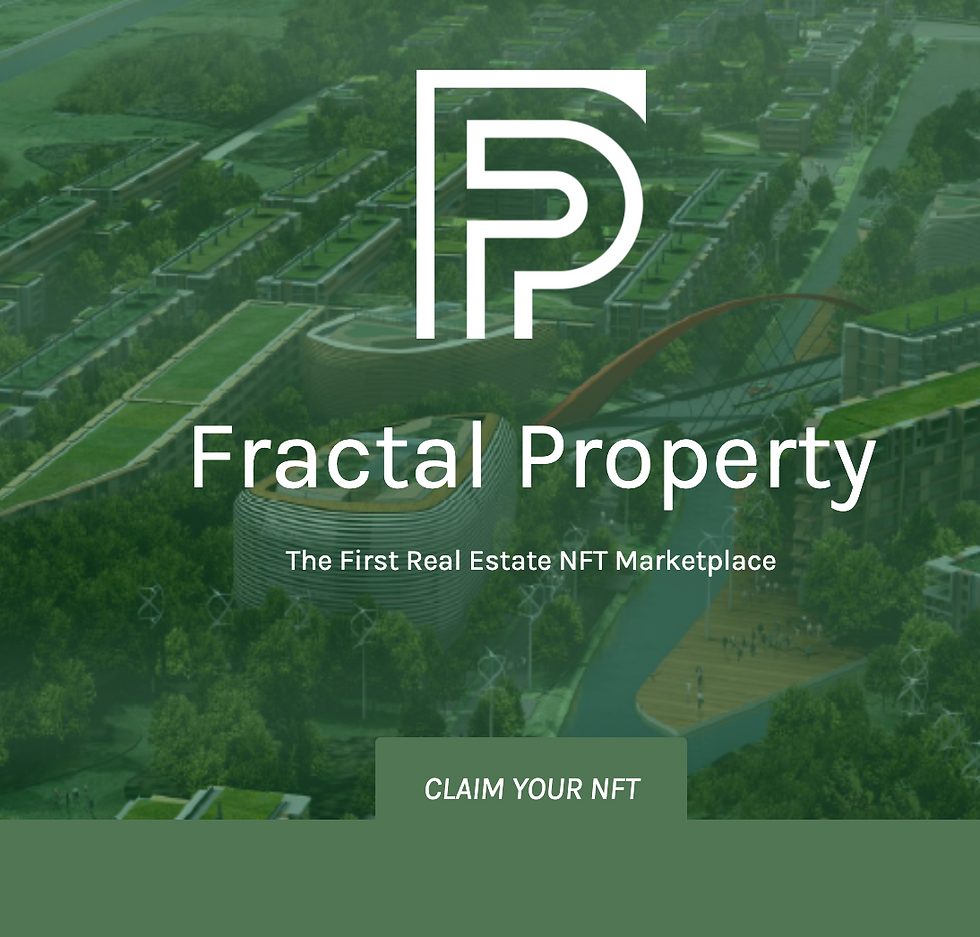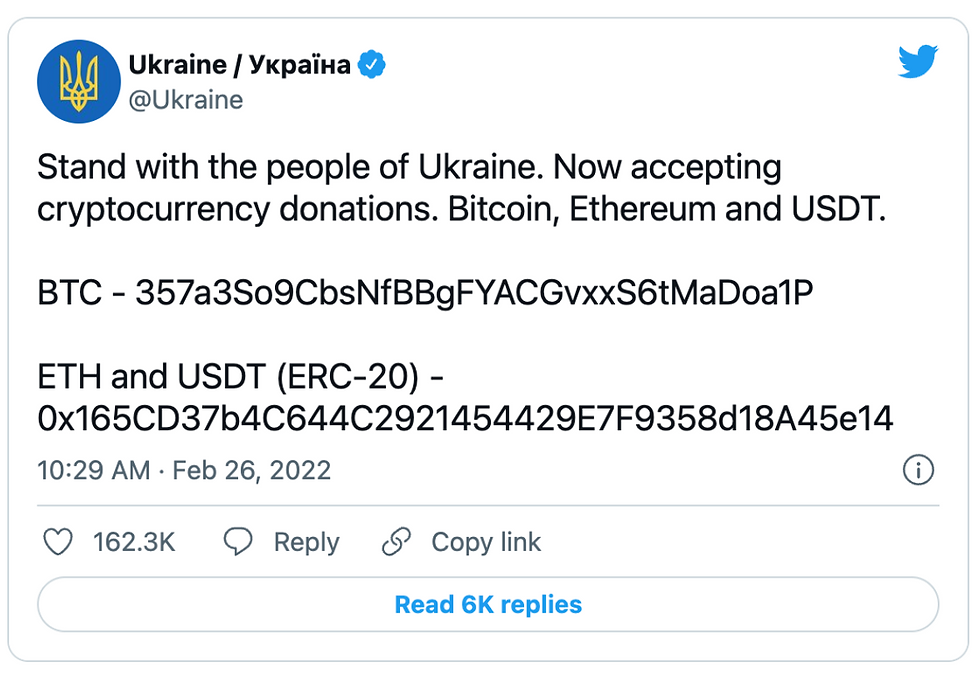Crypto News for Realtors | Issue 04
- Richard M Hopen

- Mar 2, 2022
- 7 min read
Updated: May 5, 2022

FEBRUARY 27, 2022 | Issue 04
TAKE A DEEP BREATH. PAUSE. READ.
Too many agents and friends are repelled by the complexity of crypto. They grab onto the latest headline, usually a significant drop in the price of bitcoin or a hacking incident, and dismiss the entire industry as a "house of cards" whose collapse is inevitable. Instead of rushing to judgment about crypto, I urge them to invest time by reading and learning. I ask for their email address and send them Crypto News for Realtors. It's a first step, but an important one.
Reading something longer than ten seconds is a big ask of anyone. We're all being pulled in many directions, especially on our social media feeds.
However, understanding any issue that is important, requires focus.
When you have a listing consultation, you find the time to learn about your prospect's house and the market conditions. You may memorize a few salient facts and drop stats on absorption, median sale price, and trends. This is good.
Other agents go further.
They will dig deeper and may learn about what drives interest rates and how a rate change will impact buyer demand for homes at different price points. Agents who know more and who can explain it to others will stand out. Strive to be that agent. You are reading this newsletter, because you want to learn about crypto's impact on real estate. That's great! Consider digging deeper by clicking links and seeing what's behind the story. As always, feel free to reach out to me. Please tell any agent or others about Crypto News for Realtors. I'd love to add them to the email list. Send their full name and email to richard.hopen@compass.com. Enjoy the newsletter, have a great week, and stay crypto curious! Rich Hopen PS. You can find all CNR newsletters here.
CRYPTO REAL ESTATE NEWS
▶︎ Will You Offer NFTs to Your Sellers?
I was asked by a prominent industry reporter about the future of NFTs in residential real estate. Below are his questions and my answers.
Does anything excite, or at least intrigue you, about NFTs?
NFTs can be a great marketing tool for the right type of listing. NFTs are new and associating one to a house is likely to attract attention from agents and the media.
NFTs may attract collectors who like the idea of buying an NFT attached to physical real estate. Essentially, it's an NFT collateralized by a house.
I'm interested to see how receptive real estate agents will be when learning how NFTs can be used for their listings. For you, what possibilities do NFTs and putting deals on the Blockchain hold?

One possibility is that a homeowner with an NFT could keep the NFT on an NFT marketplace. It could be listed for a high enough price that a seller would happily accept the offer. There's a startup that is working on this, Fractal Prop.
Once lenders, title companies, real estate agents, buyers, and sellers are comfortable moving real estate transactions to
NFTs, the home buying process will become streamlined. And, the risk of real estate wire fraud could be eliminated.
What concerns do you have about NFT's applications in real estate?
A buyer or seller may not have been properly advised of the risks associated with an NFT real estate transaction and they could end up losing money or incurring legal liability. Buyers, sellers, and agents who jump into the NFT space understand what they're doing.
When NFTs are used to transfer ownership of a property, the pool of buyers and sellers is a small slice of the market. These NFTs are limited to sellers who don't have a mortgage and to buyers who don't need a loan.
Do you see NFTs affecting your business in the next year? In the next five? Absolutely. I will offer an NFT option to sellers within the next year.

▶︎ What's Stranger Than Selling a House as an NFT? Buying a Virtual Property With a Mortgage!
Last week, I discussed JPMorgan's report about Opportunities in the Metaverse. The report stated, “In time, the virtual real estate market could start seeing services much like in the physical world, including credit, mortgages and rental agreements.”
One of JPMorgan's predictions came true this week.
The first mortgage for virtual land was reported by Jamie Redman in Bitcoin.com. Redman reported that Terrazero Technologies is offering loans to people who want to purchase virtual land. Terrazero's founder said, "The deed is essentially an NFT. We hold that in the company's cold storage until the loan is paid off. But we give developer rights to the land so that the person can build whatever they want. If the customer doesn't pay, then obviously we have that as our collateral." ▶︎ Startup Vesta Equity Offers NFT Alternative to Home Equity Loans Homeowners who own their homes outright may now sell fractions of ownership through an NFT that is "minted" by VestaEquity VestaEquity lists the NFT on their marketplace and sells the property to investors. When a buyer/investor purchases the NFT, the seller receives payment and there are no loan payments. The seller may elect to buy back what they had previously sold. When the seller sells their home, the NFT owners are paid their equity share of the property.
CRYPTO NEWS
▶︎ Crypto, Russia & Ukraine - Is Crypto Helping the Good Guys or Bad Guys?
The Western allies agreed to expel Russian banks from the Swift payment systems.
Swift (Society for Worldwide Interbank Financial Telecommunications) connects over 11,000 financial institutions enabling them to transfer money around the world.
Swift transfers tens of billions of dollars a day.
Banning Russia from Swift was referred to as the “nuclear option,” because its impact will likely be severe.
It will stop Russia’s imports and exports and may cause massive inflation in Russia. It could severely devalue the Russian currency and freeze their economy.
As pressure on the Russian economy increases, many wealthy Russians who are sanctioned, may consider purchasing bitcoin.
What will governments do if targeted Russians move their assets to bitcoin? Will there be legislation, regulations, policies, or executive orders beyond existing anti-money laundering laws (AML)?
If the focus is shifted from crypto as a money-laundering tool to Ukraine’s efforts to bolster its defenses against the Russian invasion, crypto will be viewed differently.
The Ukraine government reached out to the crypto community through its official Twitter account.


The tweet provides addresses where donations should be sent.
Forbes reported that more than
$4 million in crypto donations were received by Ukraine within hours after posting their plea for help on Twitter.
Is crypto good or bad?
The answer is complicated. Be wary of any governmental policy that hasn't debated the nuances.
▶︎ Crypto Trading Platform Coinbase Reported $2.2 billion in revenue from transaction fees in Q4 and Hires Goldman Sachs Exec. Coinbase doubled transaction revenue from Q3 to Q4, exceeding analysts' predictions by 27%. Coinbase also announced it was hiring Roger Bartlett, former global co-head of operations at Goldman Sachs. Bartlett will lead Coinbase's global financial operations.
CRYPTO CLASS - Web 3.0
Before explaining Web 3.0, let's take a quick look at the evolution of the web.
Web 1.0 was the internet from 1991 to 2004. Websites were essentially static pages. A user would log onto the internet and access information from a website.
As an OG ("old guy," not "original gangster"), I remember the excitement of being one of the first environmental lawyers in the US to launch a website in 1996.

In 2004, Web 2.0 began and it ushered in the era of user-created content, the spark of social media.
A handful of large tech companies control the applications that allow us to engage with each other. Our likes, comments, and time we spend on their sites gives them access to how we think and feel. They monetize our personal data.
Over the last few years, we've seen the dark side of Web 2.0. There have been breaches of privacy, mis- and disinformation campaigns. Authoritarian governments have accessed this data, giving them power to manipulate public opinion.
Web 3.0 offers a solution to these problems that are founded on decentralization.
Blockchain technology will encrypt a user's data and distribute it over thousands of nodes. No company will be able to access or monetize the data. (See Crypto News for Realtors Blockchain discussion.)
Here's how Web 3.0 is taking shape.
◎ Decentralized Autonomous Organizations (DAO) are an alternative to incorporating. DAOs are organizations based on rules that are encoded into software and controlled by its members. There is no centralized leadership and its members own the DAO. The largest DAO by market cap is Uniswap ($5.6 billion).
Here's a fascinating example of how a group of like-minded people can come together to form a DAO.

In November 2021, ConstitutionDAO was created. Its purpose was to purchase an original copy of the US Constitution that Sothebys planned to auction. In just a few days, the DAO raised $43.2 million in ETH cryptocurrency. The DAO lost the bid and refunded the money to its members.
◎ Decentralized Finance (DeFi) allows users to exchange currency and financial instruments without banks, brokerages, or other financial organizations. Some examples for DeFi include asset management, payment solutions, peer-to-peer (P2P) lending and borrowing, and digital identity. The DeFi market cap is $71.8 billion. See DeFi Pulse for info and links to top DeFi platforms.

INFLUENCERS - People to follow
Cathie Wood – @CathieDWood
Founder of Ark Investment, a fund that focuses on companies with innovative technologies. She invests in blockchain, AI, robotics, 3-D printing, DNA sequencing, and energy storage. Wood supports crypto and predicts that bitcoin will reach $1.3 million by 2030.
Last July, Wood interviewed Elon Musk and Jack Dorsey at the B Word Conference. Here's the full interview.
RESOURCES – Books, websites, podcasts, articles
I listen to CoinDesk's daily podcast, The Breakdown with NLW every day. Nathaniel Whittemore (NLW) always provides spot-on summaries of key crypto news along with intelligent commentary.
CRYPTO WORDS – FUD stands for "fear, uncertainty, doubt." Many crypto commentators attribute negative news to FUD.
OH, ONE MORE THING – Are you engaged or know someone who is? If so, look at the below tweet. I forwarded it to my daughter who is engaged, but she scoffed at it. She prefers for her wedding gifts to be in USD and not BTC.

Thanks for reading! See you next week.
Go to Crypto News for Realtors to read previous issues.







Comments